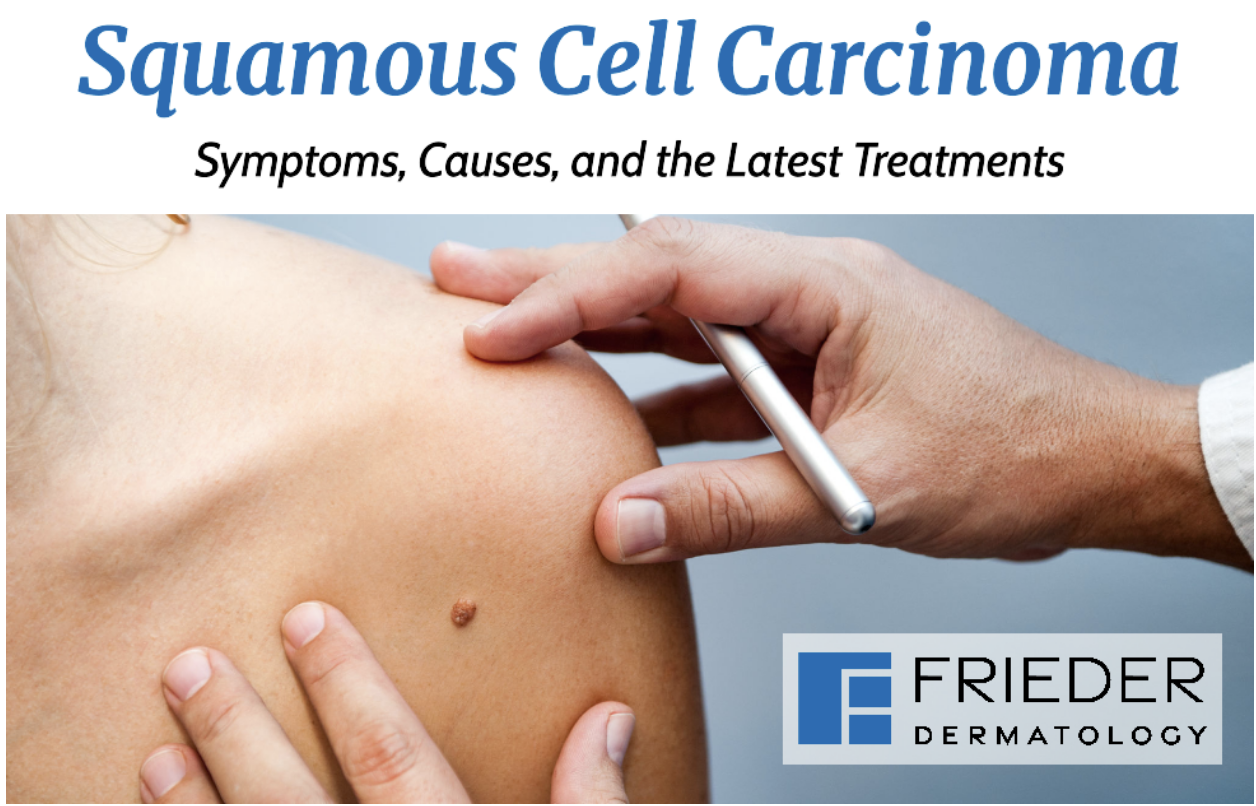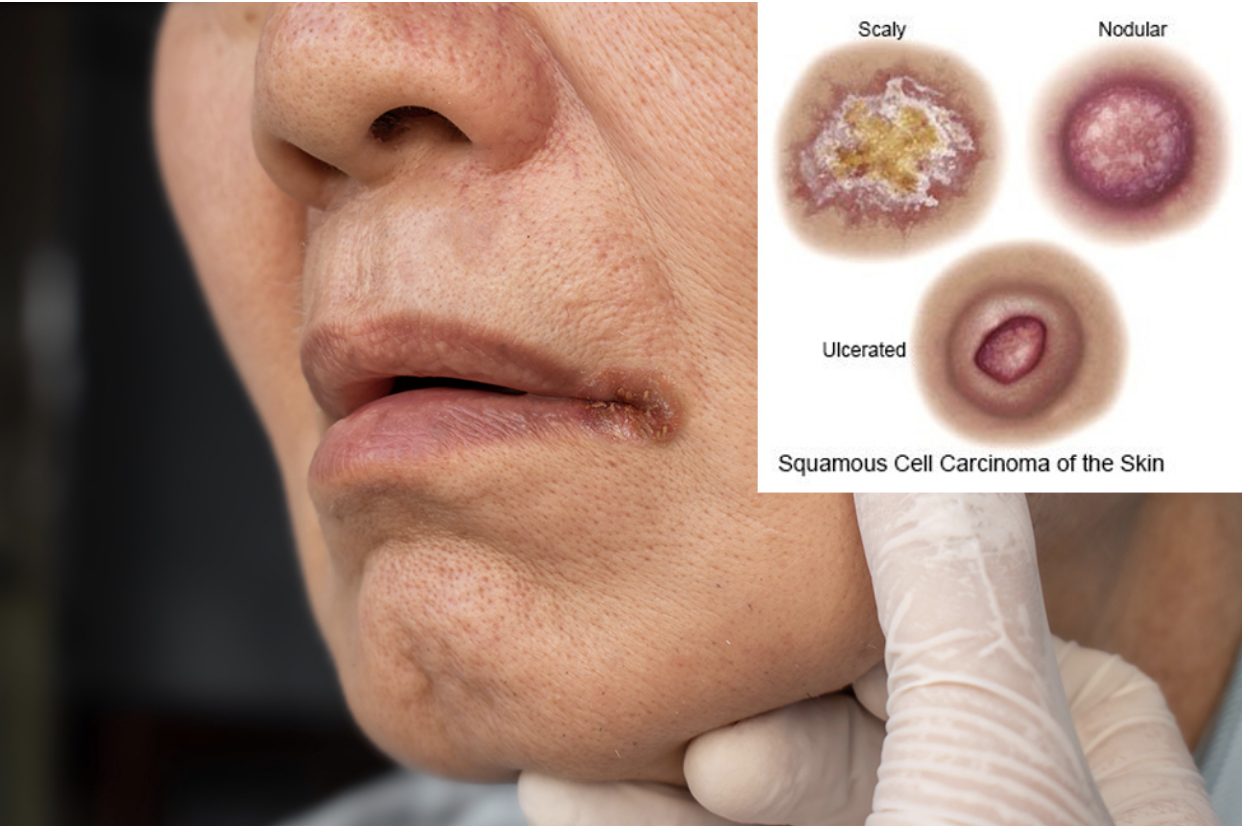Understanding Squamous Cell Carcinoma: Symptoms, Causes, and the Latest Treatment Options
Squamous Cell Carcinoma (SCC) is the second most common form of skin cancer. It develops in the outer layer of the skin and can be aggressive if not treated promptly.
This blog will explore the symptoms, causes, and the latest treatment options for SCC, emphasizing the importance of early detection and the medical dermatology treatments available.
Frieder Dermatology in Boca Raton specializes in the early detection and management of skin cancers, including SCC. Led by Dr. Jillian Frieder, a board-certified medical dermatologist, our practice offers comprehensive dermatological care.

Our team is committed to providing personalized treatment plans tailored to each patient’s needs, ensuring optimal outcomes and patient satisfaction.
What is Squamous Cell Carcinoma?
SCC is a common type of skin cancer that arises from the squamous cells in the outer layer of the skin. While it is generally less aggressive than melanoma, SCC can still cause significant damage and may spread to other parts of the body if left untreated. Early detection and treatment are crucial to prevent complications.

Symptoms of Squamous Cell Carcinoma
The symptoms of SCC can vary, but common signs include:
- Persistent Red Patches: Rough, scaly patches that may bleed or crust over.
- Open Sores: Lesions that do not heal or frequently reappear.
- Thickened Skin: Wart-like growths that may be tender to the touch.
- Firm Nodules: Raised, reddish growths that can develop a crusty surface.
Recognizing these symptoms early is essential for effective treatment. As Dr. Jillian Frieder, MD FAAD, emphasizes, “Early detection of SCC significantly improves treatment outcomes. Regular skin checks are vital.”
Causes and Risk Factors
The primary cause of SCC is prolonged exposure to ultraviolet (UV) radiation from the sun or tanning beds. Other risk factors include:
- Fair Skin: Individuals with lighter skin tones have a higher risk.
- Age: The risk increases with age, particularly in those over 50.
- Gender: Men are more likely to develop SCC than women.
- History of Sunburns: Severe sunburns, especially during childhood, increase the risk.
- Immunosuppression: Conditions or treatments that weaken the immune system can elevate the risk.
Dr. Frieder notes, “Preventative measures such as using sunscreen and avoiding tanning beds can significantly reduce the risk of developing SCC.”
Latest Treatment Options for Squamous Cell Carcinoma
At Frieder Dermatology in Boca Raton, we offer a range of advanced treatments for SCC, tailored to each patient’s needs. Some of the most common treatments available are:
Surgical Treatments
- Mohs Surgery: This precise surgical technique involves removing the cancerous tissue layer by layer while preserving as much healthy tissue as possible. It boasts a high cure rate and is ideal for SCCs in sensitive areas.
- Excisional Surgery: The tumor and a margin of surrounding healthy tissue are removed. This method is effective for larger tumors.
Non-Surgical Treatments
- Topical Treatments: For superficial SCCs, creams, and gels containing anti-cancer agents can be applied directly to the lesion.
- Cryotherapy: This involves freezing the cancer cells with liquid nitrogen. It is typically used for small, superficial lesions.
- Photodynamic Therapy (PDT): PDT uses a combination of light and a photosensitizing agent to destroy cancer cells. It is a non-invasive option with minimal side effects.
Radiation Therapy
Radiation therapy may be recommended for patients who cannot undergo surgery. It involves targeting the tumor with high-energy radiation to kill cancer cells. This treatment is particularly useful for SCCs in areas that are difficult to treat surgically.
Innovative Therapies
- Image-Guided Superficial Radiotherapy (IG-SRT): This advanced form of radiation therapy precisely targets the tumor while sparing healthy tissue. IG-SRT is effective for treating SCC with minimal discomfort and downtime. We provide GentleCure™, a non-invasive SCC treatment.
- Immunotherapy: For advanced cases, immunotherapy drugs can stimulate the body’s immune system to attack cancer cells. This treatment is often used when SCC has spread to other parts of the body.
The Role of Technology in Treatment
Technology plays a crucial role in the modern treatment of SCC. At Frieder Dermatology, we utilize the latest advancements to ensure our patients receive the best care. Dr. Frieder shares, “Innovative treatments like IG-SRT and immunotherapy represent significant strides in our ability to treat SCC effectively and with fewer side effects.”
The Importance of Follow-Up and Prevention
Post-treatment follow-up is crucial to monitor for any signs of recurrence. Regular skin exams by a medical dermatologist can help detect new or recurring SCCs early. At Frieder Dermatology, we emphasize the importance of screenings, especially for individuals with a history of skin cancer.
“Preventive care and regular check-ups are key to maintaining healthy skin and catching potential issues early,” says Dr. Frieder. “Our goal is to provide comprehensive care that addresses both treatment and prevention.”
Frieder Dermatology: Your Partner in Skin Health
At Frieder Dermatology, we are committed to offering the highest standard of care for SCC patients. Located off Clint Moore Road in Boca Raton, our clinic is equipped with state-of-the-art technology and staffed by a team of experienced professionals.
Dr. Jillian H. Frieder, MD FAAD, is a board-certified dermatologist with specialized training in psoriasis and clinical research. Her expertise in early detection and management of skin cancers, including SCC, ensures that our patients receive the best possible care.
In addition to offering SCC treatments, Dr. Frieder provides comprehensive medical and cosmetic dermatology services, including treatments for psoriasis, acne, rosacea, hair loss, and eczema. She also has a specialization in pediatric dermatology, offering compassionate care for patients of all ages.
In Conclusion
Squamous Cell Carcinoma is a serious but treatable condition. Early detection, effective treatment, and ongoing preventive care are essential for optimal outcomes. At Frieder Dermatology, we are dedicated to providing personalized, state-of-the-art care for all our patients.
Remember, your skin is your body’s largest organ, and it deserves the best care. Protect it, check it, and treat it with the expertise of a trusted medical dermatologist.
For more information on sun protection and dermatological care, visit Frieder Dermatology in Boca Raton. Dr. Jillian Frieder and her team are dedicated to providing top-notch care to help you achieve and maintain healthy skin. To book an appointment, click here or give them a call at (561) 210-7310.

